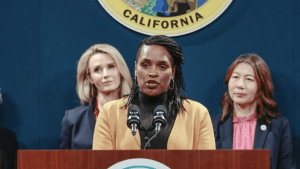By Albert L. Brooks MD | Oakland Post
Special to The Post
Presidential administrations significantly impact the health and well-being of our patients and communities.
Through the Department of Health and Human Services (HHS) and the agencies within it, such as the Centers for Medicare & Medicaid Services and the National Institutes of Health, this new administration will decide how financial resources are allocated, dictate the focus of federal research, and determine how our public health care insurance systems are managed, including the Affordable Care Act (ACA), the Children’s Health Insurance Program, the Vaccines for Children program, Medicare, and Medicaid.
The decisions made over the next four years will impact all Americans but will be felt more acutely by those most underserved and vulnerable.
As physicians, we are greatly concerned by the nominations announced by President Trump for critical healthcare-related positions. Many of their previous statements and positions are rooted in misinformation.
Coupled with their lack of government and healthcare-related experience, we are concerned these nominees will significantly undermine public health, increase the number of uninsured people, worsen health outcomes, and exacerbate health disparities. Physicians observe Hippocrates’ maxim to “First Do No Harm,”, and we urge Trump administration officials to do the same.
It is critical that the leadership of HHS and its agencies make decisions based on facts, evidence, and science. Misinformation and disinformation must not guide policymaking decisions and undermine evidence-based public health strategies. Spreading these falsehoods also erodes trust in our public institutions.
Vaccines, in particular, have been a target of disinformation by some HHS nominees. In fact, research continues to confirm that vaccines are safe and effective. Vaccines go through multiple rounds of clinical trials prior to being approved by the Food and Drug Administration (FDA) for administration to the public.
Vaccines protect against life-threatening diseases such as measles, polio, tetanus, and meningococcal disease and, when used effectively, have been shown to eliminate or substantially reduce disease prevalence and/or severity.
Because of vaccine mis- and disinformation, vaccine-preventable diseases have been resurgent such as measles and whooping cough, endangering those who are too young or unable to be vaccinated.
Several nominees have spread disinformation alleging that fluoride in public drinking water is harmful. In fact, fluoride in drinking water at the recommended level of 0.7 parts per million, like we have in our EBMUD water, is safe and keeps teeth strong. Because of public health interventions dating back to the 1960s that have resulted in 72.3% of the U.S. population now having access to fluoridated water, there has been a reduction in cavities by about 25% in both children and adults.
We also encourage the next administration to invest in our public health infrastructure. The COVID-19 pandemic highlighted the critical role of public health agencies in preventing and responding to health crises in our communities.
Health departments at the state and local levels rely on federal funding support and technical assistance to develop public health response plans, implement public health strategies, and work with on-the-ground organizations to serve hard-to-reach communities. Public health agencies are critical for protecting everyone in our communities, regardless of income level, insurance status, or housing status.
Health officials should also work to protect the significant improvements in insurance coverage that have occurred since the passage of theACAin 2010. According to HHS, uninsured Americans fell from 48 million in 2010 to 25.6 million in 2023.
California has led the way by investing in Medi-Cal and expanding enrollment eligibility. It reached its lowest uninsured rate ever in 2022 at 6.2%. Voters affirmed this commitment to developing and protecting access to care in November by passing Proposition 35, which significantly expanded funding for California’s Medi-Cal program. The administration should advance policies that strengthen the ACA, Medicaid, and Medicare and improve access to affordable health care.
Regardless of the president in power, physicians will always put the best interests of our patients and communities at the forefront. We will continue to be a resource to our patients, providing evidence-based and scientifically proven information and striving to better their lives and our community’s health. We urge the new Trump administration to do the same.
Albert L. Brooks MD is the immediate past president of the Alameda-Contra Costa Medical Association, which represents 6,000 East Bay physicians.











